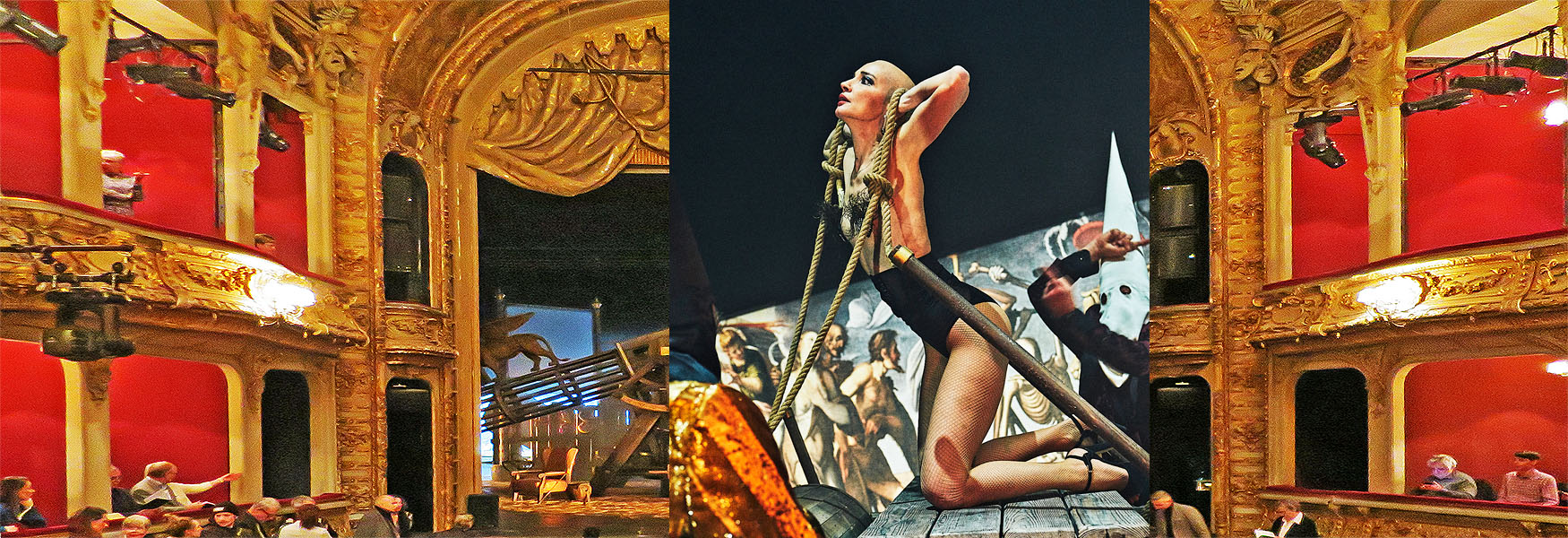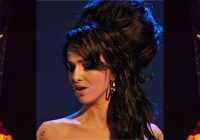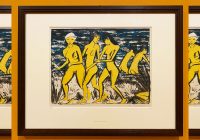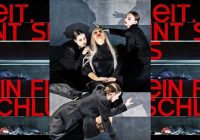Galileo Galilei im Berliner Ensemble
Von Holger Jacobs
21.01.2019
Wertung: 🙂 🙂 🙂 (drei von fünf)
Eine Schauspielerorgie mit ein bisschen Brecht.
Hintergrund
Warum Berthold Brechts „Das Leben des Galilei“ heute? – wird im Programheft des Berliner Ensembles gefragt. In einer Zeit die so wisssenschaftsgläubig und rational wie noch nie erscheint. In einer Zeit, in der uns die digitale Welt bereits völlig eingenommen hat, in der es keinen Schritt, keine Handlung mehr gibt, die nicht von Technik begleitet, ausgeführt und sogar interpretiert wird (mit Auswertung unserer Daten).
Doch gerade in dieser technikgläubigen Welt gibt es immer mehr Menschen, die mehr ihren Emotionen, als ihrem Verstand nachgeben. Schauen wir uns nur die Wahl von Donald Trump zum 45. Präsidenten der USA an (hier wäre sehr der Besuch des neuen Michael Moor Films „Fahrenheit 11/9“ zu empfehlen) oder der Wunsch der Briten aus der EU auszuscheiden. Mit logischen Menschenverstand kann das sicher nicht erklärt werden. Sondern mehr mit emotionalen Gefühlen. Dabei werden eventuelle negative Konsequenzen völlig außer acht gelassen. Nein, mit rationalem, vernunftgesteuertem Verhalten hat das nichts zu tun.
„Das Denken ist eines der größten Vergnügen der menschlichen Rasse“
läßt Berthold Brecht am Anfang des Stücks Galileo Galilei sagen. Das mag schon sein, nur ob es sich dabei um logisches Denken handelt mag stark bezweifelt werden…
Die (offizielle) Handlung
Das Theaterstück „Das Leben des Galilei“, geschrieben von Bertholt Brecht 1939 in seinem dänischen Exil, wurde 1943 in Zürich uraufgeführt. Darin erzählt er von dem italienischen Wissenschaftler Galilei Galileo, der die Idee des Kopernikus, die Erde drehe sich um die Sonne und nicht umgekehrt, im Jahre 1610 durch die Beobachtung der Jupitermonde (Dank eines selbst gebauten leistungsstarken Fernglases) beweisen konnte. Als er daraufhin von der Kirche als Ketzer verleumdet und ihm Folter angedroht wird, widerruft er seine Behauptungen.
Kritik
Wo Castorf draufsteht ist Castorf drin – darin besteht kein Zweifel!
Und das bestätigte sich an diesem Premierenabend im Berliner Ensemble. Castorf ist ein absoluter Schauspielerregisseur. Bei ihm darf gekotzt, geblutet, geschriehen, geschwitzt und nackt rumgelaufen werden. Vielleicht dürfte auch gefickt werden, wenn dies in unserer Zeit nicht doch noch eine zu große moralische Hürde bedeuten würde.
Bei Frank Castorf kommt sich der Zuschauer ein wenig wie bei einem Jahrmarkttheater vor: Zusammengewürfelte Bauten, ein wildes Durcheinanderrennen der Schauspieler, geschriehene Verse, die kaum einer versteht, Slapstick Einlagen, die die Zuschauer zum Lachen bringen und kein sichtbarer Handlungsstrang. Würde man einen Passanten von der Straße in die Vorstellung holen und ihm den Titel des Stücks nicht verraten, er würde wohl bis zum Schluss nicht wissen, um welches Drama es sich hier handelt.
Von Bertolt Brecht ist dementsprechend wenig zu sehen und zu hören. Dafür wird viel gesungen (ob Stefanie Reinsperger als Frau Sarti, die Haushälterin von Galilei, absichtlich so schlecht singt oder nur schlecht singen soll, konnte ich bis zuletzt nicht feststellen) und viel Text des französischen Theatermachers Antonin Artaud gesprochen, den die meisten von Euch kaum kennen dürften. Dieser hatte Anfang des 20. Jahrhunderts verschiedene Theorien über das Theater verfasst und Castorf scheint ihn zu lieben. Denn Artauds Schrift „Das Theater und die Pest“ ist der Untertitel zu diesem Abend.
Frank Castorf setzt aber nicht nur die Texte von Artaud hinzu, sondern fügt auch selbst ausgedachte Szenen bei, wie zum Beispiel die „Scheiß“ Szene, in der zunächst Andreas Döhler als Galileos Freund Sagredo in einen Eimer kackt und dessen Inhalt dann Stefanie Reinsperger genüßlich aufleckt. Oder die lateinischen Texte, die Jeanne Balibar (Lebensgefährtin Frank Castorfs) aufsagt, die aber keiner versteht. Oder die Stand-Up-Comedian Szene, in der sich Wolfgang Michael und Aljoscha Stadelmann schmunzelnd darüber unterhalten, wie der Vater von Frank Castorf selbst zu DDR Zeiten sich den teuren französischen Cognac Remy Martin leisten konnte. So wird aus einem eigentlich 2 1/2 Stunden Brecht-Stück ein abendfüllendes Programm von 6 Stunden Länge!
Eine besondere Erwähnung verdient der mittlerweile 86-jährige Schauspieler Jürgen Holtz, der hier den Galileo spielt. Er ist (fast) der Einzige, der den Originaltext von Bertolt Brecht sprechen darf. Auch wenn er auf Grund seines Alters nur noch die Hälfte seines Textes behalten kann und die Souffleuse ihm ständig helfen muss, so ist sein Ausdruck, sein Sprechen und sein Spiel doch die wirkliche Sensation dieses Abends. Und man spürt, warum die Stücke von Brecht so grandios gut sind!
Fazit: Ein typischer Castorf, wie ihn seine Fans lieben. Für alle anderen nur mit Vorsicht zu genießen.
„Galileo Galilei – Das Theater und die Pest“
Berliner Ensemble – Theater am Schiffbauerdamm
Premiere am 19.01.2019
Regie: Frank Castorf, Bühne: Aleksander Denic, Kostüme: Adriana Braga Peretzki, Video: Jens Crull, Andreas Deinert, Musik: Hanns Eisler u.a.
Mit: Jürgen Holtz, Stefanie Reinsperger, Sina Martens, Jeanne Balibar, Bettina Hoppe, Andreas Döhler, Wolfgang Michael, Aljoscha Stadelmann, Rocco Mylord (Sohn von Frank Castorf).
Nächste Vorstellungen: 26., 27. Januar; 10., 16. und 17. Februar 2019
Hier unsere Bilderserie mit 9 Fotos aus der „Galileo“ Produktion:

9 Photos: Jeanne Balibar, „Galileo Galilei“, Frank Castorf, Bertholt Brecht, Berliner Ensemble, Foto: Matthias Horn
english text
Galileo Galilei in the Berlin Ensemble
By Holger Jacobs
01/21/2019
An theater orgy with a bit of Brecht.
Background
Why Berthold Brecht’s „The Life of Galileo“ today? – is asked in the program booklet of the Berliner Ensemble. In a time that which is as technology-believing and rational thinking as never before. At a time when the digital world has already taken us completely, in which there is no step, no action that is not accompanied by technology, executed and even interpreted (with evaluation of our data).
But in this technology-believing world in particular, there are more and more people giving in to their emotions rather than their minds. Let’s just look at the election of Donald Trump as the 45th President of the United States (the visit to the new Michael Moor film „Fahrenheit 11/9“ is highly recommended) or the vote of the British to leave the EU. That certainly can not be explained with logical common sense. But more with emotional feelings. And any negative consequences are completely ignored. No, it has nothing to do with rational behavior.
„Thinking is one of the greatest pleasures of the human race“ says Galileo Galilei at the beginning of the play . That may be true, but whether it is logical thinking may be highly doubted …
The (official) story
The play „The Life of Galileo“ was written by Bertholt Brecht in 1939 in his Danish exile. First performed in 1943 in Zurich. There he tells of the Italian scientist Galileo Galileo, who could prove the idea of Copernicus, the earth revolves around the sun and not vice versa, in 1610 by observing the Jupiter moons (thanks to a self-built powerful binoculars). When he is then slandered by the church as a heretic and threatened with torture, he revokes his claims.
Critics
When Castorf is on the title there is Castorf in the piece – there is no doubt! And that was confirmed on this premiere evening in the Berliner Ensemble. Castorf is an absolute actor director. The actors are allowed to puke, bleed, scream, sweat and run around naked. Maybe they could also fuck, if this in our time would not mean still a too big moral hurdle. With Frank Castorf, the audience feels a bit like in a fairground theater: ragtag buildings, a wild racing of the actors, shouted verses that hardly anyone understands, slapstick deposits that make the audience laugh and no visible strand of a story. If one would get a pedestrian from the street into the performance and not tell him the title of the play, he probably would not know until the end which drama this is about.
Accordingly, there is little to see and hear from Bertolt Brecht.
There is a lot of singing and a lot of text by the French theater maker Antonin Artaud, most of you barely should know. Artaud had written various theories about theater at the beginning of the 20th century and Castorf seems to love him. For Artaud’s writing „The theater and the plague“ is the subtitle to this evening.
Frank Castorf not only adds the lyrics of Artaud, but also adds his own imaginary scenes, such as the „shit“ scene, where Andreas Döhler as Galileo’s friend Sagredo makes kaka in a bucket and then Stefanie Reinsperger licks it out. Or the Latin texts, which Jeanne Balibar (life partner Frank Castorfs) recites, but which nobody understands. Or the stand-up comedian scene in which Wolfgang Michael and Aljoscha Stadelmann chatter about how the father of Frank Castorf could afford the expensive French cognac Remy Martin even in GDR times. Thus, from an actual 2 1/2 hours Brecht piece, this evening is taking now 6 hours!
A special mention deserves the now 86-year-old actor Jürgen Holtz, who plays Galileo. He is (almost) the only one who is allowed to speak the original text by Bertolt Brecht. Even though he can only keep half of his text due to his age and the Souffleuse has to help him constantly, but his expression, his speech and his play is the real sensation of the evening. And you can feel why the pieces by Brecht are so terribly good.
Conclusion: A typical Castorf, as his fans love. For all others, only with caution to enjoy.
„Galileo Galilei – The Theater and the Plague“ Berliner Ensemble – Theater am Schiffbauerdamm
Premiere on 19/01/2019
Director: Frank Castorf, Stage: Aleksander Denic, Costumes: Adriana Braga Peretzki, Video: Jens Crull, Andreas Deinert, Music: Hanns Eisler
With: Jürgen Holtz, Stefanie Reinsperger, Sina Martens, Jeanne Balibar, Bettina Hoppe, Andreas Doehler, Wolfgang Michael, Aljoscha Stadelmann, Rocco Mylord (son of Frank Castorf).
Next performances: 26., 27. January; 10, 16 and 17 February 2019
Author: Holger Jacobs
Founder & Editorial Director of kultur24.berlin ug.
Founder & Editorial Director of kultur24 TV on Youtube.
Former correspondent for fashion in Paris.
Photographer, writer and filmmaker.











